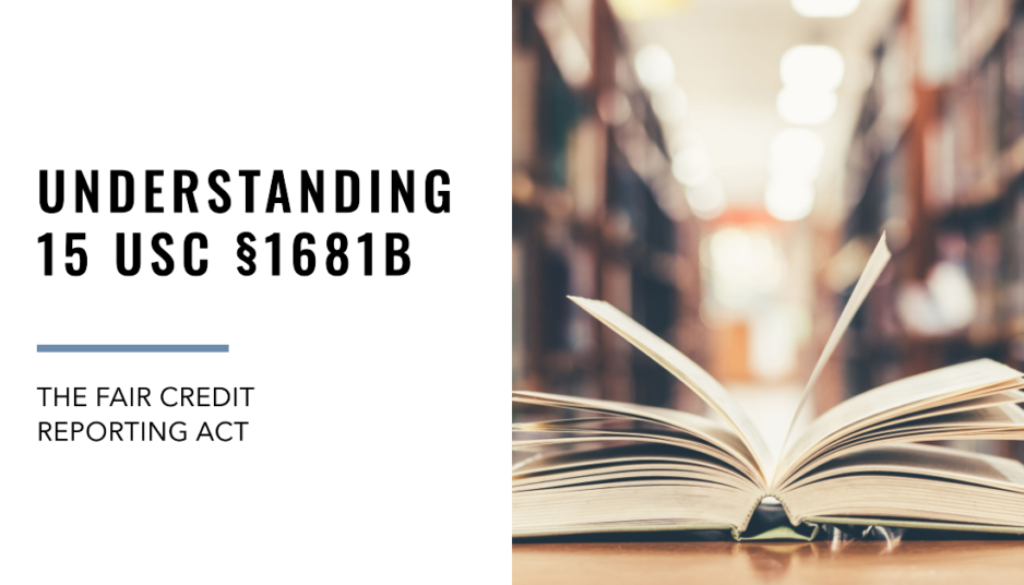Understanding 15 USC §1681b: The Fair Credit Reporting Act
Understanding 15 USC §1681b: The Fair Credit Reporting Act
In this article, I will explain what 15 USC §1681b is and why it is important for consumers and businesses. 15 USC §1681b is a section of the Fair Credit Reporting Act (FCRA), a federal law that regulates the collection, dissemination, and use of consumer credit information. The FCRA aims to protect consumers from inaccurate or unfair credit reporting practices and to promote the efficiency and fairness of the credit system.

What is 15 USC §1681b?
15 USC §1681b specifies the permissible purposes of consumer reports, which are records of a consumer’s credit history, payment habits, and other personal information that are compiled by consumer reporting agencies (CRAs). CRAs are entities that collect and sell consumer information to third parties, such as creditors, employers, insurers, landlords, and government agencies. Some examples of CRAs are Equifax, Experian, and TransUnion.
Permissible purposes for obtaining consumer reports
According to 15 USC §1681b, CRAs may furnish a consumer report under the following circumstances and no other:
– In response to the order of a court having jurisdiction to issue such an order, or a subpoena issued in connection with proceedings before a Federal grand jury.
– In accordance with the written instructions of the consumer to whom it relates. (“Permissible Purpose | Client Support | TransUnion”)
– To a person which it has reason to believe intends to use the information for one of the following purposes:
– In connection with a credit transaction involving the consumer on whom the information is to be furnished and involving the extension of credit to, or review or collection of an account of, the consumer. (“Permissible Purpose | Client Support | TransUnion”)
– For employment purposes.
– In connection with the underwriting of insurance involving the consumer. (“Permissible Purpose | Client Support | TransUnion”)
– In connection with a determination of the consumer’s eligibility for a license or other benefit granted by a governmental instrumentality required by law to consider an applicant’s financial responsibility or status. (“Application Instructions for A Facility License”)
– As a potential investor or servicer, or current insurer, in connection with a valuation of, or an assessment of the credit or prepayment risks associated with, an existing credit obligation. (“15 USC 1681b: Permissible purposes of consumer reports – House”)
– Otherwise has a legitimate business need for the information in connection with a business transaction that is initiated by the consumer or to review an account to determine whether the consumer continues to meet the terms of the account. (“Regulations: Defining Application | Bankers Online”)
15 USC §1681b also imposes certain restrictions and obligations on the users of consumer reports. For example, users must:
– Obtain the consent of the consumer before obtaining a consumer report for employment purposes or before taking any adverse action based on such a report.
– Provide notice to the consumer when taking any adverse action based on a consumer report, such as denying credit, insurance, or employment, or increasing the cost of such services.
– Disclose to the consumer the source and nature of any information obtained from a CRA that adversely affects the consumer’s credit score or rating.
– Dispose of any consumer report records in a secure manner that prevents unauthorized access or use.
Conclusion
The purpose of 15 USC §1681b is to ensure that consumer reports are used only for legitimate and lawful purposes that benefit both consumers and businesses. By limiting the access and use of consumer reports, 15 USC §1681b protects consumers’ privacy and prevents identity theft, fraud, discrimination, and other harms that may result from misuse or abuse of consumer information. By allowing access and use of consumer reports for certain purposes that are relevant and necessary for business decisions, 15 USC §1681b facilitates the efficient and fair functioning of the credit system and promotes economic growth and opportunity.
FAQs
- Can I obtain my consumer report more than once a year?
- Yes, you can obtain additional copies of your report for a fee or if you have been denied credit or employment based on information in your report.
- Can a consumer reporting agency provide my report to anyone without my consent?
- No, a consumer reporting agency must have written consent from the consumer before providing their report to anyone.
- How long can negative information stay on my consumer report?
- Negative information, such as late payments or collections, can generally stay on your report for up to seven years.
- Can a business use a consumer report for any purpose?
- No, businesses can only use consumer reports for permissible purposes as outlined in 15 USC §1681b.
- What should I do if I find an error on my consumer report?
- You should contact the consumer reporting agency to dispute the error and have it corrected.
Sources:

You must be logged in to post a comment.